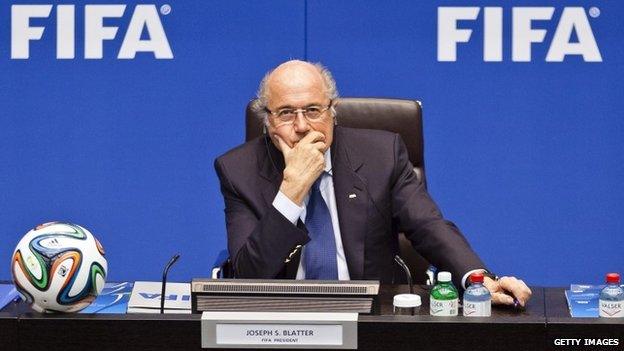Why aren't sponsors tougher on Fifa?
- Published
- comments

Joseph "Sepp" Blatter, president of Fifa - which holds more power over its sponsors than we think.
The Fifa scandal is an "absolute disaster" for the multinationals who sponsor it - because they cannot escape taint from the perceived lapses of football's supreme governing body.
That is the view of a range of very senior business people and marketing gurus to whom I have spoken.
One said: "This is a nightmare for them - the reputational damage is huge".
So why aren't these huge and powerful global companies doing what the UK culture secretary John Whittingdale has asked, and following the lead of Visa - which said it would review its sponsorship deal if Fifa does not clean up its act?
Well, part of the answer is implicit even in the less mild sabre-rattling of Visa. Because it is striking that even Visa only said it might review its commercial relationship with Fifa, not that it was doing so.
The point, according to well-placed executives, is that Coca Cola, Hyundai, Budweiser, McDonald's, Gazprom and Visa (among others) have signed legally binding contracts.
So they may not be able to get out of the contracts without paying spectacular damages - given that they are each believed to be paying Fifa up to $200m (£130m) over four years for the marketing opportunities associated with the World Cup.
"They are all asking their lawyers to examine whether they have 'moral' clauses in their contracts, which would allow them to get out because of Fifa's behaviour," said a businessman with links to the sponsors.
There is another point, though - put to me by a member of one of the sponsor's boards - which is that the World Cup is "the best sponsorship opportunity on the planet".
How so?
Well, association football is arguably the world's most global sport - though the Olympics and Formula One also have serious worldwide reach.
And the World Cup allows the sponsors to get their names in front of hundreds of millions of consumers, both in the rich West and in the faster-growing economies of Asia and South America.
What I am told makes World Cup sponsorship particularly special is that Fifa is far less prescriptive about how the sponsoring companies promote their brands and conduct their marketing than the Olympic Organising Committee.
"Fifa is the least anal and controlling of its sponsors," said a marketing executive. "And that is highly prized."
Or to put it another way, although all the sponsors want to be seen to be doing the "right thing" by putting pressure on Fifa to reform, they are fearful that if they completely incinerate their relationships with the World Cup, they may simply be providing a precious and rare marketing opportunity to their bitterest rivals.